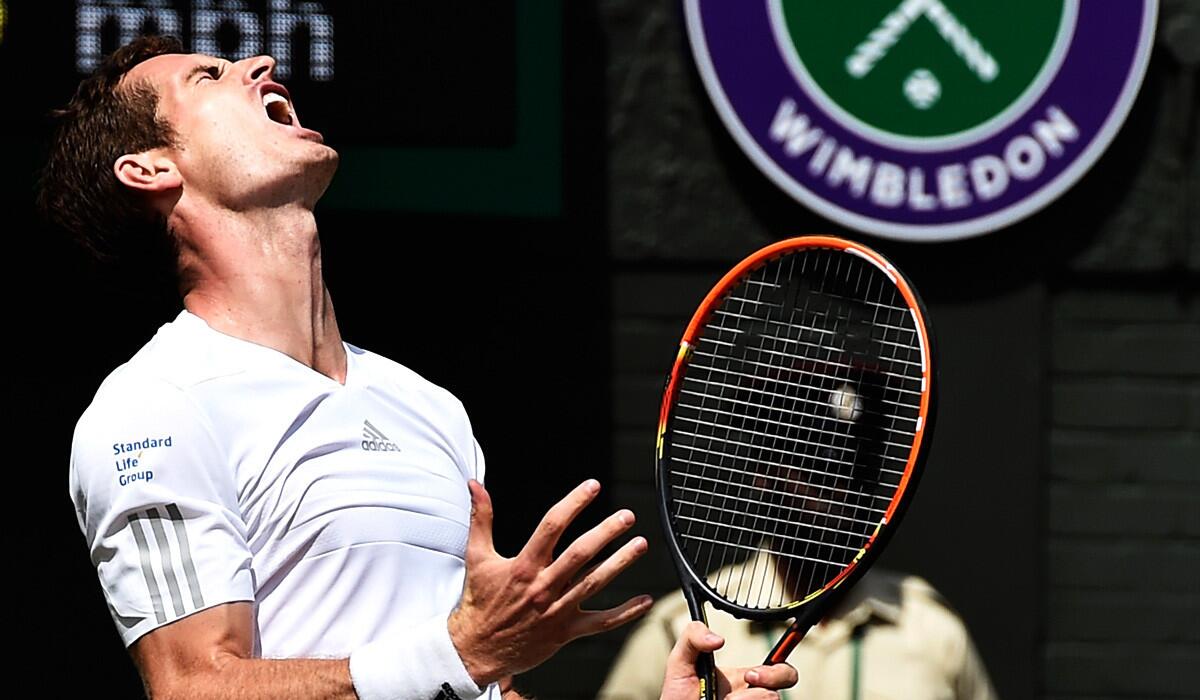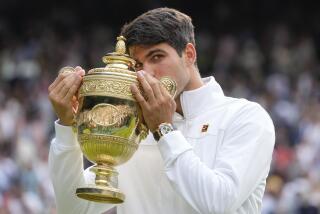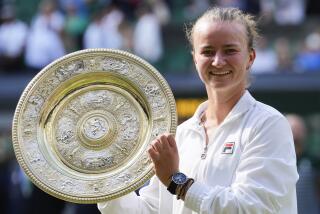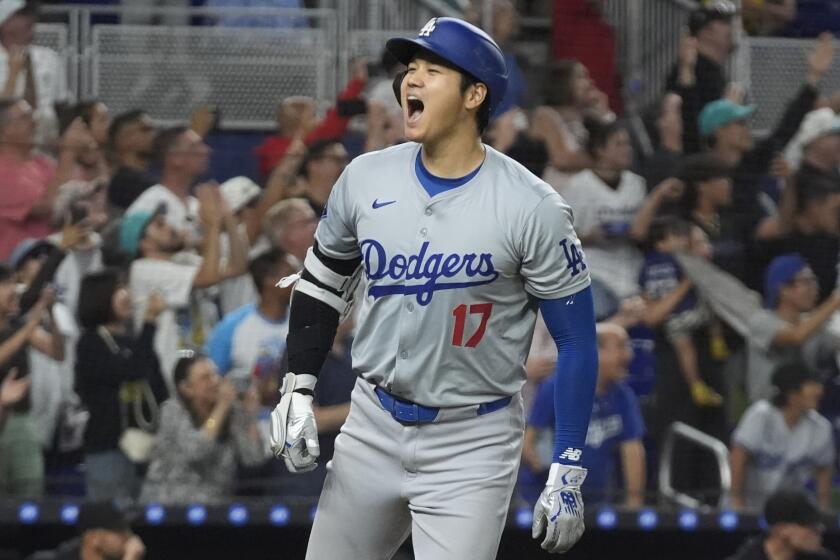Column: For Andy Murray, a Wimbledon prize — and reprise — proves elusive

On the warmest, sunniest day you can imagine, in a place where those are few and far between, gloom prevailed Wednesday. Great Britain was Mudville, and mighty Casey had struck out.
When Andy Murray’s final ground stroke settled into the bottom of the net in midafternoon, eliminating him from a chance to defend his Wimbledon gentlemen’s singles title, a big gush of air was sucked out of the United Kingdom.
They take their sports very seriously here. So too their heroes.
They needed Wimbledon and a repeat surge of the national adrenaline that Murray had provided last year, when he had exorcised the ghosts of Fred Perry past.
It seemed like forever that they had waited for their next men’s Wimbledon champion. It was always Fred Perry, 1936. That was 77 years, but who’s counting?
They had remained hopeful, supportive. They even named a huge terraced viewing area with a giant TV screen behind Court 1 after one of their biggest hopefuls. For years, Tim Henman tried and tried, and never quite made it. But his name remains on the hill, even if that is unofficial.
Then along came Murray, their Andy, giving them the ultimate hope with an Olympic gold medal in 2012 right on the court where he would contest for the real prize, the Bye-Bye Fred Perry Trophy, the cup that says Wimbledon champion.
In 2012, before the Olympics, Murray lost in the final to Roger Federer and cried on Centre Court. Their hearts went with him. They had worried that he was boring, plastic, more a creation of tabloid journalism than a real person. Now they knew a heart beat within. They embraced him and could sense their wishes soon to be fulfilled when he won his first major title, the U.S. Open.
He was real. He could do it.
And he did, beating Novak Djokovic in the 2013 Wimbledon final. He climbed into the box seats to hug his support team and the entire United Kingdom hugged him back.
But sports is much like life. Now it was Wimbledon 2014, and, with Murray, there was a touch of what-have-you-done-for-us-lately. After all, Fred Perry not only won that title in 1936, but did so by repeating from the previous two years.
Why shouldn’t Murray repeat?
It seemed to become even more crucial when England was quickly eliminated in the World Cup, a passion here even bigger than Murray. The first question to Murray in his pre-Wimbledon news conference was whether he would win here to soothe the hurt of the World Cup for a despondent nation. Yes, that was the word. Despondent.
A few days later, it got worse. A team from a big country across the pond that doesn’t even call the sport by its correct name had qualified for the World Cup knockout round. Humiliation simmered amid the strawberries and cream. Every tabloid with another World Cup postmortem seemed to have an adjacent picture and story of Murray.
The 27-year-old Scot handled all this beautifully, better than anybody might imagine. At first look, and during interview sessions, he seems boring. He is everything but.
He went through his first four matches like the London Tube trains through the London tunnels. When he took Centre Court on Wednesday, he had won 17 matches in a row at the All-England Club. That, of course, included his Olympic run, his 2013 title and the four matches here in which he had not lost a set and only a total of 32 games.
He was playing well, but the pressure was building and there were signs. Kate and William were in the royal box. They don’t show for any old match.
His opponent was a fast-rising Bulgarian, Grigor Dimitrov, 23. The day before, there was a buzz about how youngsters were starting to take over. Then 19-year-old Australian Nick Kyrgios took out Rafael Nadal.
Now, here was Dimitrov, who had won a lead-up grass-court tournament and had nine wins in a row on the fast surface. There was also the huge intangible. Dimitrov, a big, strong, good-looking guy, had once dated Serena Williams. Now he dates Maria Sharapova.
This was a guy who knew pressure.
And so it came to pass, with Centre Court jammed and Henman Hill overflowing, that Dimitrov brought his A game and Murray did not.
The Bulgarian won the first set, 6-1, and promise for British fans became hope. When Murray missed, the collective sound on the grounds was a gasp. When he made a good shot, the gush of joy sounded more like a sigh of relief.
The last hope was when Dimitrov went up a service break in the second set and Murray broke back. But in the ensuing tiebreaker, Murray made an ill-advised net approach and when Dimitrov passed him, the Bulgarian had two serves and a 5-4 lead. Deal over.
Hope fizzled early in the final set, and pathos took over when Murray hit an 83-mph second serve that went long and took Dimitrov to match point.
It was over, 6-1, 7-6 (4), 6-2. There was nothing left to say, although Murray said it well.
“He was the better player, from start to finish,” he said, calling it a bad day at the office.
Half of men’s tennis’ Big Four is now out. Novak Djokovic survived a tough five-setter against Marin Cilic, Serb beating Croat. Roger Federer, the ageless wonder, dropped his first set of the tournament, but won in four over his Swiss buddy, Stan Wawrinka.
When Nadal was ousted Tuesday by Kyrgios — who predictably lost Wednesday to Milos Raonic — he said he was heading home to the beach in Majorca. Murray said he would head back to the practice courts “to get better.”
The hero, and the country that made him so, are back to hoping.
Twitter: @dwyrelatimes
More to Read
Go beyond the scoreboard
Get the latest on L.A.'s teams in the daily Sports Report newsletter.
You may occasionally receive promotional content from the Los Angeles Times.











